初中英语语法系列---否定句疑问句
- 格式:ppt
- 大小:1.16 MB
- 文档页数:62
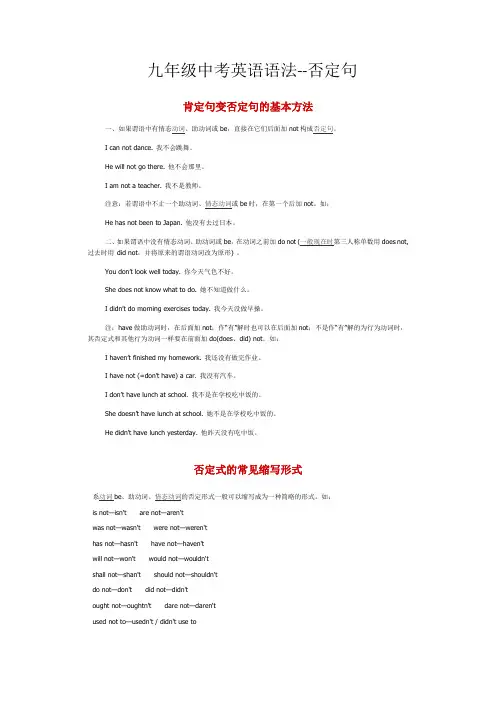
九年级中考英语语法--否定句肯定句变否定句的基本方法一、如果谓语中有情态动词、助动词或be,直接在它们后面加not构成否定句。
I can not dance. 我不会跳舞。
He will not go there. 他不会那里。
I am not a teacher. 我不是教师。
注意:若谓语中不止一个助动词、情态动词或be时,在第一个后加not。
如:He has not been to Japan. 他没有去过日本。
二、如果谓语中没有情态动词、助动词或be,在动词之前加do not (一般现在时第三人称单数用does not,过去时用did not,并将原来的谓语动词改为原形) 。
You don’t look well today. 你今天气色不好。
She does not know what to do. 她不知道做什么。
I didn’t do morning exercises today. 我今天没做早操。
注:have做助动词时,在后面加not;作“有”解时也可以在后面加not;不是作“有”解的为行为动词时,其否定式和其他行为动词一样要在前面加do(does、did) not。
如:I haven’t finished my homework. 我还没有做完作业。
I have not (=don’t have) a car. 我没有汽车。
I don’t have lunch at school. 我不是在学校吃中饭的。
She doesn’t have lunch at school. 她不是在学校吃中饭的。
He didn’t have lunch yesterday. 他昨天没有吃中饭。
否定式的常见缩写形式系动词be、助动词、情态动词的否定形式一般可以缩写成为一种简略的形式。
如:is not—isn't are not—aren'twas not—wasn't were not—weren'thas not—hasn't have not—haven'twill not—won't would not—wouldn'tshall not—shan't should not—shouldn'tdo not—don't did not—didn'tought not—oughtn't dare not—daren'tused not to—usedn't / didn't use tono与not的几个区别区别一:no是形容词,可直接放在名词之前。

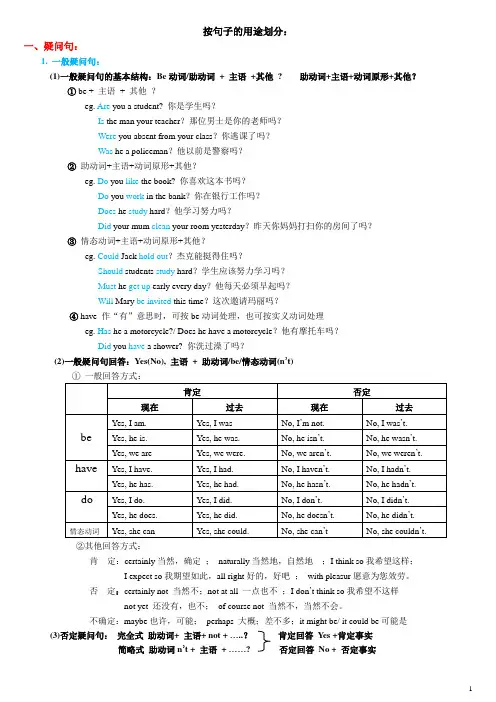
按句子的用途划分:一、疑问句:1. 一般疑问句:(1)一般疑问句的基本结构:Be动词/助动词+ 主语+其他? 助动词+主语+动词原形+其他?①be + 主语+ 其他?eg. Are you a student? 你是学生吗?Is the man your teacher?那位男士是你的老师吗?Were you absent from your class?你逃课了吗?Was he a policeman?他以前是警察吗?②助动词+主语+动词原形+其他?eg. Do you like the book? 你喜欢这本书吗?Do you work in the bank?你在银行工作吗?Does he study hard?他学习努力吗?Did your mum clean your room yesterday?昨天你妈妈打扫你的房间了吗?③情态动词+主语+动词原形+其他?eg. Could Jack hold out?杰克能挺得住吗?Should students study hard?学生应该努力学习吗?Must he get up early every day?他每天必须早起吗?Will Mary be invited this time?这次邀请玛丽吗?④have 作“有”意思时,可按be动词处理,也可按实义动词处理eg. Has he a motorcycle?/ Does he have a motorcycle?他有摩托车吗?Did you have a shower? 你洗过澡了吗?(2)一般疑问句回答:Yes(No), 主语+ 助动词/be/情态动词(n’t)②其他回答方式:肯定:certainly当然,确定;naturally当然地,自然地;I think so我希望这样;I expect so我期望如此,all right好的,好吧;with pleasur愿意为您效劳。
否定:certainly not 当然不;not at all 一点也不;I don’t think so我希望不这样not yet 还没有,也不;of course not 当然不,当然不会。
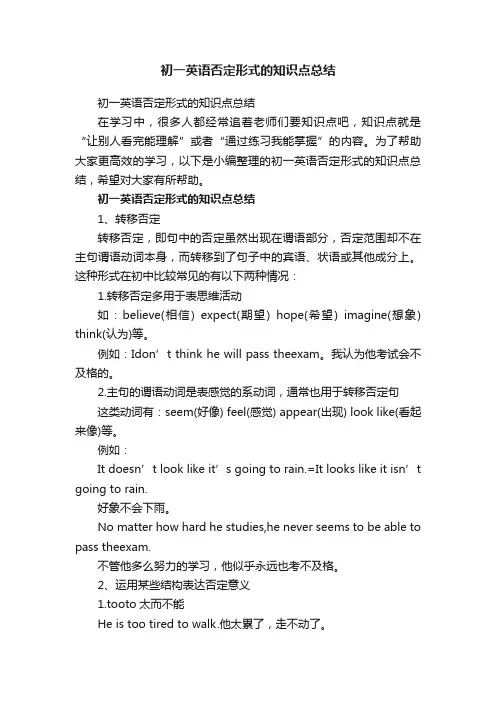
初一英语否定形式的知识点总结初一英语否定形式的知识点总结在学习中,很多人都经常追着老师们要知识点吧,知识点就是“让别人看完能理解”或者“通过练习我能掌握”的内容。
为了帮助大家更高效的学习,以下是小编整理的初一英语否定形式的知识点总结,希望对大家有所帮助。
初一英语否定形式的知识点总结1、转移否定转移否定,即句中的否定虽然出现在谓语部分,否定范围却不在主句谓语动词本身,而转移到了句子中的宾语、状语或其他成分上。
这种形式在初中比较常见的有以下两种情况:1.转移否定多用于表思维活动如:believe(相信) expect(期望) hope(希望) imagine(想象) think(认为)等。
例如:Idon’t think he will pass theexam。
我认为他考试会不及格的。
2.主句的谓语动词是表感觉的系动词,通常也用于转移否定句这类动词有:seem(好像) feel(感觉) appear(出现) look like(看起来像)等。
例如:It doesn’t look like it’s going to rain.=It looks like it isn’t going to rain.好象不会下雨。
No matter how hard he studies,he never seems to be able to pass theexam.不管他多么努力的学习,他似乎永远也考不及格。
2、运用某些结构表达否定意义1.tooto太而不能He is too tired to walk.他太累了,走不动了。
2.more A than B(与其B不如A)或more than+含有can的从句例如:1、They oung man is more brave than wise.这年轻人有勇无谋。
2、The grat it ude for your help is more than I can express.对于你给我的感激之情我无法言表。
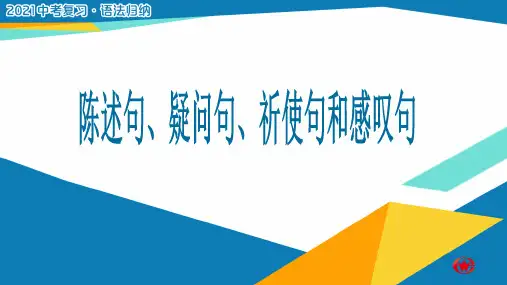
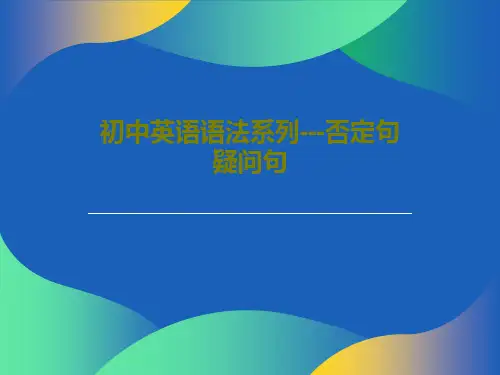
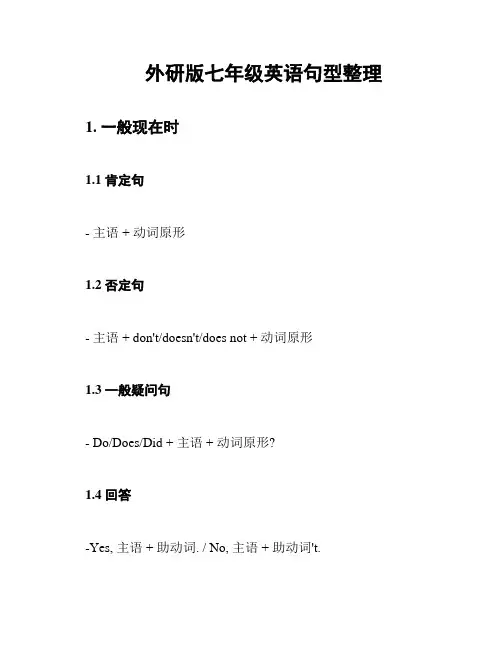
外研版七年级英语句型整理1. 一般现在时1.1 肯定句- 主语 + 动词原形1.2 否定句- 主语 + don't/doesn't/does not + 动词原形1.3 一般疑问句- Do/Does/Did + 主语 + 动词原形?1.4 回答-Yes, 主语 + 助动词. / No, 主语 + 助动词't.2. 一般过去时2.1 肯定句- 主语 + 动词过去式2.2 否定句- 主语 + didn't/did not + 动词过去式2.3 一般疑问句- Did + 主语 + 动词过去式?2.4 回答-Yes, 主语 + 助动词. / No, 主语 + 助动词't.3. 一般将来时3.1 肯定句- will + 动词原形3.2 否定句- won't + 动词原形3.3 一般疑问句- Will + 主语 + 动词原形?3.4 回答-Yes, 主语 + will. / No, 主语 + won't.4. 被动语态4.1 一般现在时- am/is/are + 动词过去分词 + by + 主语4.2 一般过去时- was/were + 动词过去分词 + by + 主语4.3 一般将来时- will be + 动词过去分词 + by + 主语5. 宾语从句5.1 一般现在时- 主语 + 动词原形 + that/if/whether + 从句5.2 一般过去时- 主语 + 动词过去式 + that/if/whether + 从句5.3 一般将来时- 主语 + will + 动词原形 + that/if/whether + 从句6. 定语从句6.1 关系代词- who/whom/which/that + 谓语动词6.2 关系副词- where/when/why/how + 谓语动词7. 情态动词7.1 肯定句- can/may/must + 动词原形7.2 否定句- can't/can not/may not/must not + 动词原形7.3 一般疑问句- Can/May/Must + 主语 + 动词原形?7.4 回答-Yes, 主语 + 助动词. / No, 主语 + 助动词't.8. 祈使句- 动词原形 + 其他9. 不定式- to + 动词原形10. 现在分词- 动词 -ing11. 过去分词- 动词过去式以上是外研版七年级英语句型的整理,希望对大家有所帮助。
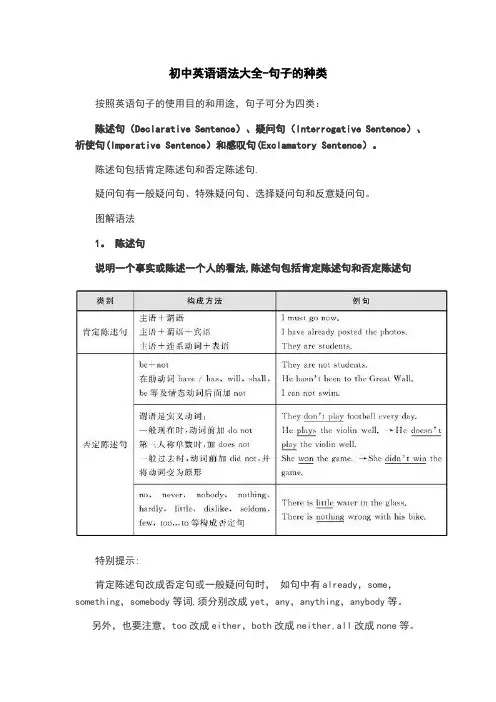
初中英语语法大全-句子的种类按照英语句子的使用目的和用途,句子可分为四类:陈述句(Declarative Sentence)、疑问句(Interrogative Sentence)、祈使句(Imperative Sentence)和感叹句(Exclamatory Sentence)。
陈述句包括肯定陈述句和否定陈述句.疑问句有一般疑问句、特殊疑问句、选择疑问句和反意疑问句。
图解语法1。
陈述句说明一个事实或陈述一个人的看法,陈述句包括肯定陈述句和否定陈述句特别提示:肯定陈述句改成否定句或一般疑问句时,如句中有already,some,something,somebody等词,须分别改成yet,any,anything,anybody等。
另外,也要注意,too改成either,both改成neither,all改成none等。
2. 疑问句3. 常用的特殊疑问句4. 特殊的反意疑问句①主句是祈使句时,“will you?"意为“请求",“won't you?”表示提醒对方注意。
例句:Look at the blackboard, will you / won’t you?Don’t be late again, will you?②感叹句后的反意疑问,用一般现在时态的否定形式例句:What fine weather, isn’t it?How beautifully she sings, doesn’t she?③陈述部分是“I am …”时,用“aren’t I?"而不用“am not I?”例句:I'm working now, aren’t I?④陈述部分主语是everything,nothing,anything或something 时,疑问句主语用it例句:Something is wrong with my radio, isn’t it?Nothing is difficult, is it?⑤陈述部分的主语是somebody, nobody, everybody, anybody, no one, none, neither 时,疑问句的主语用they例句:Everyone is here, aren't they?No one knows about it, do they?⑥陈述部分的主语是:1) this或that时,问句的主语用it2) these或those时,问句主语用they3) there be句时,反意疑问句中用there例句:This is a plane, isn’t it?These are grapes, aren’t they?There was a hospital here, wasn’t there?⑦陈述部分的主语是one时,问句的主语可用one,也可用you (美语用he)例句:One should be ready to help others, shouldn't one?⑧陈述句中有few, seldom, never hardly,not,rarely,no,nobody,too…to等时,疑问句部分用肯定结构;如由前后缀构成否定词,疑问句部分仍用否定结构例句:He is never late for school, is he?You got nothing from him, did you?It is useless, isn’t it?⑨陈述部分主语是从句、不定式(短语)、动词-ing形式时,疑问句的主语用it例句:What you need is more important, isn’t it?⑩陈述部分由think, believe, suppose, imagine等引导的宾语从句:1) 主语是第一人称时,问句与从句的主谓语一致2) 主语是其他人称,问句与主句的主谓语一致例句:I think he will come, won’t he?I don’t think he can pass the exam, can he?He believed you had seen her before, didn’t he?? have是实义动词时,疑问句用助动词do,does,did;have 是助动词,则不然例如:They had a meeting just now, didn’t they?She’s been to many places of interest, hasn't she??陈述部分有have /has /had to 时,疑问句要用助动词的否定形式例句:You have to water the vegetables now, don’t you?? 陈述部分有had better时,疑问句中用hadn’t刘局:We had better go to school at once, hadn’t we?? 陈述部分有must:1) 作“一定;必须”解释时,疑问句用mustn’t或needn’t;2) 表示推测,作“一定是;必定"解释时,疑问句需根据其后的动词原形选用相应的形式;3) 对过去动作推测时,问句的助动词用did或have;4) 对过去的状态推测时,问句的be用was例句:He must work hard at physics, mustn’t he?You must go to Guangzhou, needn’t you?You mustn’t smoke here, must you?Tom must be at home, isn’t he?She must have finished her work, hasn’t/didn’t she?He must have been a policeman, wasn’t he??陈述部分有ought to,used to,疑问句要用 shouldn’t,usedn’t / didn’t例句:Jill used to be a teacher, usedn’t / didn’t she??陈述句部分是复合句时,疑问句的主语和助动词要与主句一致例句:He was reading when the teacher came in, wasn't he?特别提示:反意疑问句是“否定陈述句+肯定问句”时,如回答内容是肯定的,用“Yes+肯定结构”,反之,用“No+否定结构”。

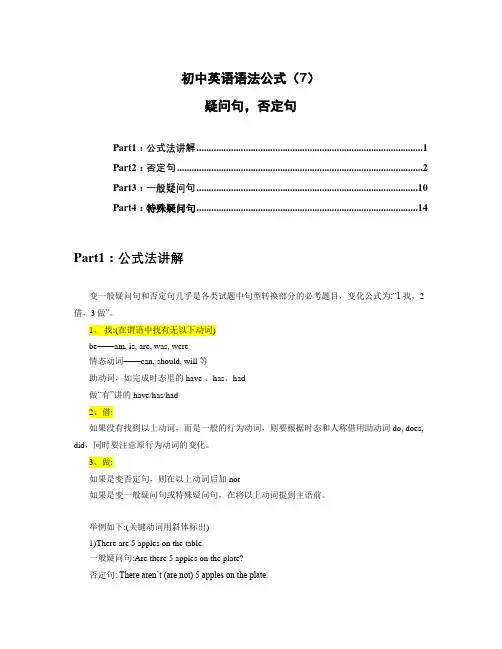
初中英语语法公式(7)疑问句,否定句Part1:公式法讲解 (1)Part2:否定句 (2)Part3:一般疑问句 (10)Part4:特殊疑问句 (14)Part1:公式法讲解变一般疑问句和否定句几乎是各类试题中句型转换部分的必考题目,变化公式为:“1找,2借,3做”。
1、找:(在谓语中找有无以下动词)be——am, is, are, was, were情态动词——can, should, will等助动词,如完成时态里的have 、has、had做“有”讲的have/has/had2、借:如果没有找到以上动词,而是一般的行为动词,则要根据时态和人称借用助动词do, does, did,同时要注意原行为动词的变化。
3、做:如果是变否定句,则在以上动词后加not如果是变一般疑问句或特殊疑问句,在将以上动词提到主语前。
举例如下:(关键动词用斜体标出)1)There are 5 apples on the table.一般疑问句:Are there 5 apples on the plate?否定句: There aren’t (are not) 5 apples on the plate.2)We can take him there.一般疑问句:Can we take him there?否定句: We can’t (cannot) take him there.3) Alice goes to school by bus.一般疑问句:Does Alice go to school by bus?否定句:Alice doesn’t (does not) go to school by bus.变一般疑问句和否定句的公式掌握了之后,只要举一反三,就得出变特殊疑问句的方法了,也就是在相应的疑问词后加一般问句语序即可。
如对“Alice goes to school by bus.”这句中的方式状语“by bus”提问,就是:How does Alice go to school?这里需要特别一提的是,以上“公式”适用于一般情况下变疑问句、否定句的题目,如果遇到特殊情况,如带有both/all的句子、祈使句等,则要个别特殊情况特殊处理。
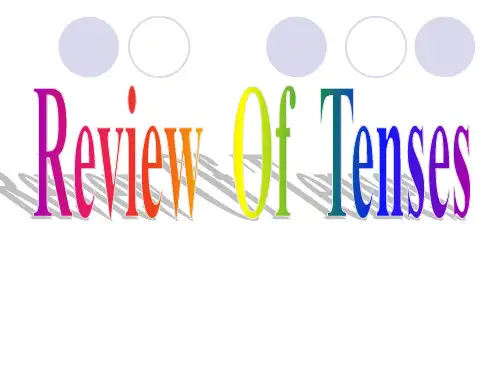
初中英语语法训练专题(十二)疑问否定句系列复习题疑问否定句基本型将下列句子改为否定句和一般疑问句do eye exercises everyWe _____ _____ eye exercises every day. _____ _____ _____ eye exercises every day?2. Mr. Brown has to go home on foot. Mr. Brown _____ _____ to go home on foot. _____ Mr. Brown _____ to go home on foot?3. There is something wrong with the radio._____ _____ wrong with the radio._____ _____ _____ wrong with the radio?4. Li Peng’s already finished his homework.Li Peng _____ finished his homework _____._____ Li Peng finished his homework _____?5. Lucy will stay there for some time. Lucy _____ stay there for _____ time. _____ Lucy stay there for _____ time?6. Tom always goes to bed at twelve. Tom _____ _____ to bed at_____ Tom always _____ to bed at twelve?7. He was reading when his mother came back home.He _____ reading when his mother _____ back home._____ he reading when his mother _____ back home?8. His younger sister can do some washing, too.His younger sister _____ do _____ washing, _____._____ his younger sister do _____ washing, too?9. I’ve ever been to Beijing three times.I _____ _____ been to Beijing three times._____ you _____ been to Beijing three times?10. You’d better help him with hi s maths. You _____ _____ _____ help with his maths. _____ you _____ help him with his maths? 就下列句子划线部分提问11. Li Ming’s brother usually lives ina factory._____ _____ usually lives in a factory?12. There are two apples. The red one is bigger._____ _____ is bigger?13. They are singing and dancing in the next room._____ _____ they _____ in the next room?14. He is going to work with his father after school._____ _____ is he going to work afterschool?15. John prepares his English lessons every evening._____ _____ John _____ every evening?16. The lady in white is our Chinese teacher._____ _____ is your Chinese teacher? 17. I met Mr. Smith at the park yesterday. ____ and _____ _____ you _____ Mr. Smith?18. She stopped washing because the telephone rang._____ _____ she _____ washing?19. The woman with glasses looks like our headmaster._____ _____ the woman with glasses _____ like?20. Ten Americans will visit our school next week._____ _____ Americans will visit your school next week?21. There’re ten Americans in our school._____ _____ Americans _____ _____ in your school?22. The picture on the wall is beautiful. _____ is the picture on the wall _____?23. His overcoat is brown._____ _____ is his overcoat?24. She is my sister and she is a nurse. _____ is she and _____ is she?25. The day was fine yesterday.____ was the day _____ yesterday?26. Professor Smith lives in Room 207. _____ _____ does Professor Smith live in?27. It took us two hours to get there. _____ _____ did it _____ you to get there?28. Miss Mary writes to her parents twicea month._____ _____ _____ Miss Mary write to her parents?29. We’ve seen the film for three times. ____ _____ _____ have you seen the film?30. This new English-Chinese dictionary cost ten dollars.___ _____ _____ this new English-Chinese dictionary cost?31. His father went to work on foot yesterday._____ _____ his father _____ to work?32. Mr Smith wanted to learn Chinese. _____ did Mr Smith want to _____?33. The Smiths all enjoy watching TV. _____ _____ the Smiths all enjoy _____ ?34. Today is Thursday and tomorrow is July 1._____ _____ is today and _____ the _____ tomorrow?35. My grandpa usually has rice for lunch. _____ _____ your grandpa usually _____ for lunch?36. The population of Germany is about eight-one million._____ the population of Germany?37. I’ve given him three piece of paper. _ ____ _____ paper has been given to him?38. The trousers on the chair are mine. _____ _____ are yours?39. They studied in No. 101 Middle School. _____ _____ Middle School _____ they study?40. The story is very good._____ do you _____ the story?完成下列反意疑问句:41. The little boy hurt his foot, _____ _____?42. There were only six people present, _____ _____?43. There goes the bell, _____ _____?44. You’d better not stand in the way, _____ _____?45. You’d like to go there, _____ _____?46. Lucy has to do some washing, _____ _____?47. The twins had to walk home, _____ _____?48. Jim needn’t sing this song, _____ _____?49. You need to wait for her, _____ _____?50. I think he is wrong, _____ _____?51. We don’t believe he will come, _____ _____?52. I think they knew little about it,_____ _____?53. I’m sure you’ll help us, _____ _____?54. David says (that) you will come on time, _____ _____?55. Let’s go to the cin ema together, _____ _____?56. Don’t make any noise, _____ _____?57. Not only I but also he has been there, _____ _____?58. Neither you nor she lives there, _____ _____?59. I wish to see you again, _____ _____?60. Everyone is having a good time on the farm, _____ ____?61. Nothing has happened here, _____ _____?62. What cold weather, _____ _____?63. What a kind girl, _____ _____?64. How fast John runs, _____ _____?65. Most of the books are mine, _____ _____?66. Most of the food was left, _____ _____?67. None of us knew what to do, _____ _____?68. Few people knew this word, _____ _____?69. Nobody likes that brown dog, _____ _____?70. So you aren’t a student, _____ _____?71. You must study English hard next term, _____ _____?72. We mustn’t be la te, _____ _____?73. You must be from America, _____ _____?74. Linda must have seen that play last month, _____ _____?75. Linda can’t be a doctor, _____ _____?76. The king was unhappy, _____ _____?77. It is impossible for me to do it, _____ _____?78. I must start at once or we can’t get there on time, _____?79. David is a farmer but his wife isn’ta farmer, _____ ____?80. The little girl could hardly speak at the age of 3, _____ _?提高型1. She is a good student, _____ she?(1999北京)A. isB. isn’tC. doesD. doesn’t2. -_____ do you go to the park?-Once a year.(1999新疆)A. How oftenB. How longC. How soonD. How many times3. -_____ books do you have?(1999西安) -Oh! I can’t remember the number, but a lot of them.A. WhatB. WhichC. How manyD. How much4. Let’s have a rest, _____?(1999甘肃)A. won’t youB. will youC. don’t youD. shall you5. -_____ have you been in this city?-For ten years. (1999昆明)A. How oftenB. How longC. How soonD. When6. -_____ did you move to Paris?(1999广西)-Because my father found work there.A. WhereD. How7. She’s been to the new airport, _____ she?(1999上海)A. isn’tB. wasn’tC. doesn’tD. hasn’t8. He hardly hurt himself in the accident, _____?(1999重庆)A. doesn’t heB. didn’t heC. did heD. does he9. The poor man needs our help, _____ he?(1999河北)A. needB. needn’tC. doesD. doesn’t10. -_____ and _____ are we going to have the meeting?-At half past eight in our school.A. What; whereB. When; howC. Who; whereD. When; where综合型1. “_____ does it take me from my school to your school?”“About five minutes.”A. How manyB. How farC. How muchD. How long2. “_____ bag is this?” “It’s mine.”(1999河北)A. WhatB. WhoC. Who’sD. Whose3. The Canadian girl knows little Russian, _____ she?(江西)A. doesn’tB. doesC. isn’tD. is4. Today they’re going to have real English food, _____?A. isn’t itB. aren’t theyC. doesn’t itD. don’t they5. Alice has to finish her work now, _____ she?(1999河南)A. hasB. hasn’tC. doesD. doesn’t6. Miss Chen caught a bad cold last week, _____ she?(宁夏)A. didn’tB. hadn’tC. doesn’tD. hasn’t7. “_____ did you buy the new bag?” “Last Monday.”(1999北京)A. WhereB. HowC. WhenD. Who8. There _____ apples in the basket.(1998南京)A. aren’t anyB. isn’t anyC. wasn’t someD. weren’t some9. I _____ the film last Saturday.(1997广西)A. don’t seeB. didn’t seeC. hadn’t seeD. not saw10. _____ of us _____ a knife to cut pencils.(1997陕西)A. All; usesB. No one; useC. None; useD. Some; uses11. He’s given an important report on the work of the govemment, _____?(上海) A. isn’t heB. is heC. hasn’t heD. has he12. I don’t think he will come here on time, _____?(重庆)A. won’t heB. will heC. does heD. is he13. –The boy hardly watch TV in the evening, _____ he?-_____.A. isn’t; No, he isn’tB. is; No, hedoesn’tC. doesn’t; Yes, he doesD. does; Yes, he does14. -_____ do you water the flowers?-Twice a week. (2000山西)A. How longB. How soonC. How muchD. How often15. –She didn’t come to school yesterday, did he?(北京海淀-_____, though she was not feeling very well.A. No; she didn’tB. Yes, she didn’tC. No, she didD. Yes, she did。
初中英语语法精讲之疑问句考点归纳与练习疑问句是一种用于询问信息、寻求答案的句子类型。
在写作中,疑问句通常用于提出观点、表达疑虑、引导对话等。
疑问句的类型包括陈述疑问句和特殊疑问句。
陈述疑问句是最常见的类型,它用于询问事实或信息,如“你今天吃了什么早餐?”;特殊疑问句则用于询问特定信息,如“你喜欢吃什么食物?”。
特殊疑问句和陈述疑问句是两种不同类型的疑问句。
它们的主要区别在于所询问的信息类型不同。
特殊疑问句:用于询问特定信息,通常以特殊疑问词开头,如“谁”、“什么”、“为什么”等。
例如:“你是谁?”、“你在哪里?”、“你为什么要这样做?”等等。
特殊疑问句通常需要直接回答提问者想要知道的信息。
陈述疑问句:用于询问事实或信息,通常以陈述句的形式出现,只是末尾加上问号。
例如:“你今天吃了什么早餐?”这种疑问句通常不需要直接回答提问者的问题,而是提供一种机会让对话双方交流信息。
特殊疑问句特殊疑问句在英语中有以下几种类型:What-type question: 用来询问事物的名称或描述,如“What is this?”或“What does this mean?”。
Who-type question: 用来询问人的名称或身份,如“Who is that?”或“Who is the leader of the country?”。
Whose-type question: 用来询问某物属于谁,如“Whose car is this?”或“Whose book is this?”。
Which-type question: 用来询问某物中的某一个选项,如“Which book do you like better?”或“Which season do you like best?”。
When-type question: 用来询问某件事情发生的时间,如“When did you start learning English?”或“When will the exam be held?”。
一般现在时、一般过去时和一般将来时知识及初中语法口诀一般现在时一般现在时有三种形式1.谓语是be(am/is/are)的一般现在时。
①肯定形式:主语+be+表语(形容词、名词充当表语)。
I am hungry.You are beautiful.He is a doctor.②否定形式:主语+be+not+表语(形容词、名词充当表语)。
I am not hungry.You aren't beautiful.He isn't a doctor.③一般疑问句形式:Be+主语+表语(形容词、名词充当表语)?肯定回答:Yes,主语+be. 否定回答:No, 主语+ be+not.—Are you hungry?—Yes,I am./No,I'm not.—Is he a doctor?—Yes, he is./No, he isn,t.④特殊疑问句形式:特殊疑问词+Be开头的一般疑问句?—What is he?—He is a doctor.注意:be要随着主语变。
2.谓语动词是实义动词(及物动词或不及物动词)的一般现在时。
①肯定形式:“主语+及物动词+宾语”或“主语+不及物动词”。
She has a little brother.她有一个弟弟。
The sun rises in the east.太阳从东方升起。
②否定形式:“主语+don't/doesn't+及物动词+宾语”或“主语+don't/doesn't+不及物动词”。
She doesn't have a little brother.她没有弟弟。
I don't eat every morning.我每天早晨都不吃饭。
③一般疑问句形式:“Do/Does+主语+及物动词原形+宾语”或“Do/D oes+主语+不及物动词原形”。
肯定回答:Yes,主语+do/does. 否定回答是:No, 主语+ don't/doesn't.—Do you eat every morning?—Yes, I do./No, I don't.—Does she have a little brother?—Yes, she does./No, she doesn't.④特殊疑问句:特殊疑问词+do/does开头的一般疑问句?What do you like?When do you go to school?注意:根据主语确定用do还是does。
初中英语语法总结整理初中英语语法学习1. 句式问题A) 含any-的一般用于疑问句、否定句或条件句中,但表示“无论何事”时,可用于肯定句。
如:Do you have anything to say你有什么话要说吗I didn’t meet anybody new at the party.在那次聚会上我没有碰到任何生人。
John can do it, if anyone can.如果有人能做此事,那就是约翰了。
He will do anything for a quiet life.只要能过上安宁的日子他什么都愿意做。
B) 含some-的一般用于肯定句,也用于表示请求邀请的疑问句或预计是肯定回答的疑问句。
如:I have something to ask you.我有事情要问你。
Are you expecting someone this afternoon今天下午你是不是等什么人C) 含every-的可用于肯定句、疑问句、否定句。
He lost everything that was dear to him.他所珍贵的一切都损失了。
Is everybody here到齐了吗(比较:Is anybody here 这里有人吗)2. 否定问题含no-的是完全否定,not与含any-的也构成完全否定,但没有any-…not 的说法;not与由含every-的是部分否定。
如:She doesn’t know anyone here. She has got no one to talkto.她在这里一个人也不认识;她没有人谈话。
I a gree with most of what you said, but I don’t agree with everything.我同意你说的大部分内容我并非同意你讲的一切。
Everyone cannot do it.=Not everyone can do it.并不是每个人都能做这个。